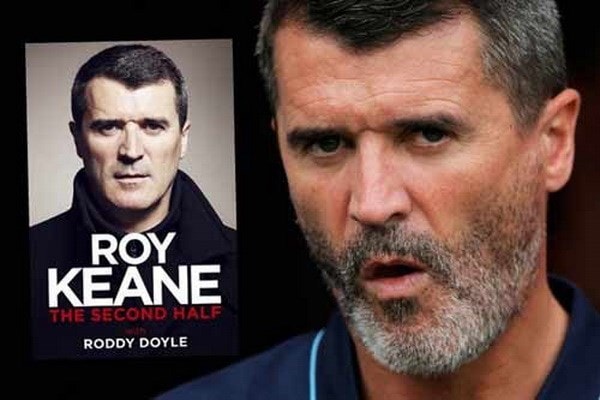Roy Keane's autobiography will reveal the "deep secrets" of MU
Former Manchester United captain Roy Keane's upcoming autobiography, "The Second Half", is currently creating a stir on most newspapers and social networks.
Many of the "hidden secrets" of MU have been revealed by Keane in the book that will officially hit shelves today, October 9.
 |
| Roy Keane reveals many secrets from his time playing for MU (Source: Getty) |
Color is the conflict with Sir Alex Ferguson
Since leaving Old Trafford in 2005, Roy Keane has been a controversial figure among the Red Devils fan community. No one can forget the contribution of the midfielder wearing the number 16 shirt during his 12 years wearing the red shirt, but Keane's statements always go against that glorious past.
In March 2012, when Sir Alex's MU lost to Real Madrid in the UEFA Champions League round of 16, the focus was on the controversial red card of referee Curtney Cakir. Roy Keane then stated frankly that Nani had committed a foul and the red card was completely deserved for the Portuguese midfielder. There is no question whether the Irish midfielder's statement was right or wrong, but at that extremely sensitive time, what Keane said was no different from a direct attack on MU, specifically the midfielder's former teacher.
Things are expected to get even more tense when the autobiography “The Second Half” is released. It is not an exaggeration to say that the main color that created Keane’s second work was the conflict with his former teacher Sir Alex Ferguson. The former MU captain revealed all the secrets of MU during the time this midfielder played in Manchester, from the conflict to the point of fighting with Peter Schmeichel in Hong Kong, refusing the number 7 shirt left by Eric Cantona to the story of not liking Rio Ferdinand, deciding not to move to Real Madrid in… the toilet and supporting the Glazers.
But above all is the story of the old hatred with his old teacher. In this autobiography, the conflict with the "Old Man" was pushed to the peak when Keane claimed that the legendary MU coach had "played a trick" on him by arranging to push this midfielder out of Old Trafford. Back then, MU had just lost 4-1 away to Middlesbrough in poor form, while Keane had not been able to play since September due to injury. After the match, the Irish midfielder gave an interview on MUTV with harsh criticism of his teammates and his teacher.
Keane was later fined £5,000 internally but the story was not over. Clashes, arguments and struggles with Edwin Van der Sar, Carles Queiroz and Sir Alex Ferguson himself later drove the MU leader out of England. Keane was sold in the winter and his destination was Celtic. At the end of the 2005-2006 season, this midfielder retired.
Back to reality, the autobiography also gave the midfielder's perspective on that difficult time, "Now I wish I hadn't apologised to them" (Keane apologised to Sir Alex and Carles Queiroz some time after leaving MU), "I'm not sure why I apologised. I just wanted to do the right thing. I apologised for what happened, but I don't feel sorry for my behaviour or my stance".
In the final notable detail of his autobiography, Roy Keane compares for the first time two of the greatest managers in English football history, both of whom were his mentors, Sir Alex Ferguson and the late legendary coach Brian Clough. The Irish midfielder highly appreciated both legendary managers in many aspects from team management to motivating the players. However, Keane believes that Brian Clough is better than Sir Alex Ferguson and commented that the MU “Hairdryer” “lacks sincerity and warmth.”
Autobiography is the savior for former football stars
It is not uncommon for a famous football player to publish an autobiography, and as the trend becomes more widespread, it is not difficult to see that autobiographies have invisibly become a tool to promote the image of that player.
When mentioning Japp Stam, the image of a tall central defender always appears, but then there are certainly stories in the autobiography of the former MU defender and the anecdote that Stam was pushed out of Old Trafford because of it. At the present time, every autobiography released by a famous player is always welcomed by many media outlets from social networks to newspapers, Zlatan Ibrahimovic and Andrea Pirlo are the clearest proof of that fact, the book "I am Zlatan" (I am Zlatan) by the Swedish striker has also become a book labeled "best-seller."
Or Sir Alex Ferguson himself, when he retired at the end of the 2012-2013 season, also released an autobiography that caused a stir around the world for a long time with shocking statements such as "Gerrard is not a world-class player," "David Beckham was forced to leave" or "Since he fell into Victoria's arms, everything has changed."
It is easy to see the fact that all autobiographies of famous players are commercial, many shocking stories are revealed, many conflicts are exposed to the light. That is always a gold mine for publishers, there is no football fan who does not want to know what happens behind the football field or in the dressing room. Autobiographies hit that psychology and … sell well, that's all.
Roy Keane's autobiography is not yet known how true it is, but it promises to make a huge impact on the media in the near future, simply because issues about Manchester United or Sir Alex Ferguson never cool down.
After October 9th, when the autobiography is officially released, the whole of England will continue to be crazy about it for a very long time. And even if there are many problems with the authenticity of the stories in it, the person who will benefit the most will still be Roy Keane because at that time the commercial value of the book will have reached its peak.
According to Vietnam+
